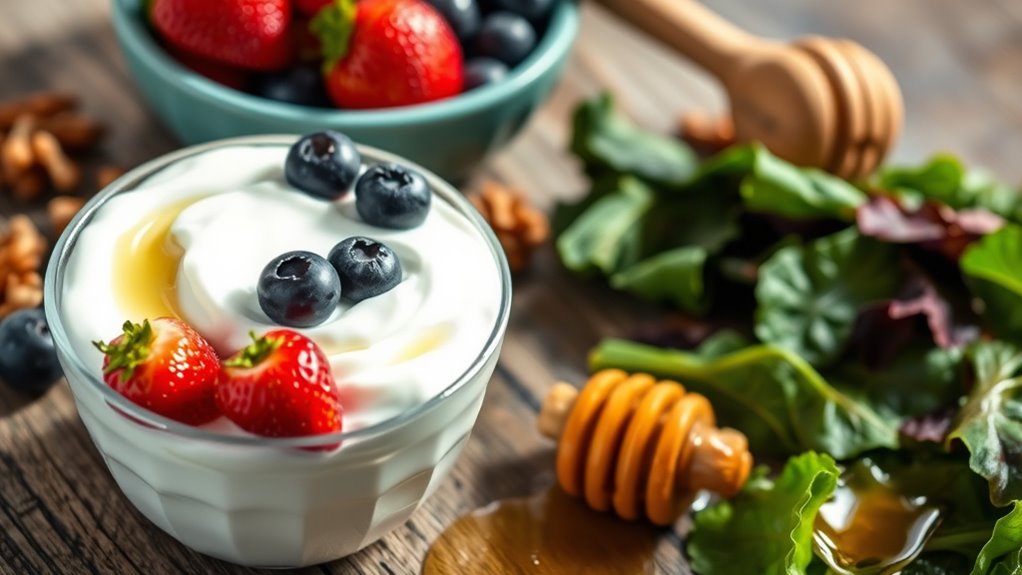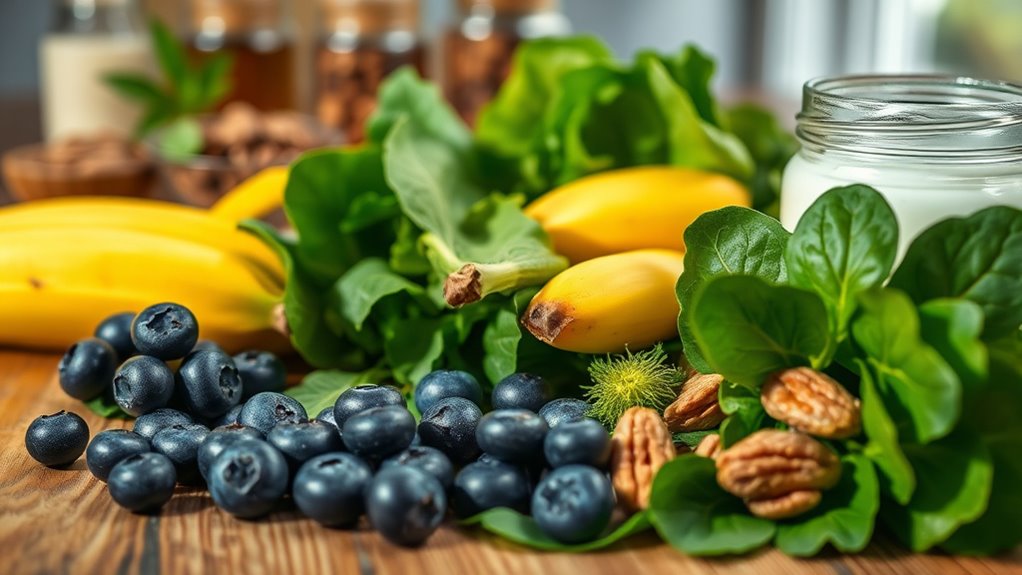To boost your mood naturally through your gut-brain axis, focus on eating probiotic-rich foods like yogurt, kefir, sauerkraut, and kimchi, which help rotate your gut bacteria and support neurotransmitter production. Incorporate prebiotic foods such as garlic, onions, and bananas to nourish beneficial bacteria and strengthen gut health. A diverse, fiber-rich diet also promotes microbiome resilience, improving emotional stability. Continue exploring how your diet can enhance mental well-being and mood.
Key Takeaways
- Consuming probiotic-rich foods like yogurt, kefir, sauerkraut, and kimchi supports beneficial gut bacteria that enhance mood.
- Prebiotic foods such as garlic, onions, leeks, and bananas nourish microbiome diversity, promoting neurotransmitter production.
- A fiber-rich, diverse diet strengthens the gut-brain connection, helping regulate stress and emotional stability.
- Reducing processed foods and artificial additives prevents microbiome disruption, supporting mental clarity and mood.
- Maintaining microbiome health through balanced probiotics, prebiotics, and fiber improves mood and cognitive function naturally.

The connection between your gut and brain is more powerful than you might realize, influencing your mood, stress levels, and mental clarity. This link, known as the gut-brain axis, relies heavily on your gut’s microbiome—a complex community of trillions of microorganisms. When your microbiome diversity is high, it promotes better communication between your gut and brain, helping regulate emotions and mental states. A diverse microbiome ensures that your gut can produce a variety of neurotransmitters, like serotonin and gamma-aminobutyric acid (GABA), which directly impact your mood and stress responses. If your microbiome is imbalanced or lacking diversity, it can lead to reduced neurotransmitter production, making you more prone to anxiety, depression, or mental fog.
To support a thriving microbiome, you should focus on foods that foster microbiome diversity. Fermented foods such as yogurt, kefir, sauerkraut, and kimchi are excellent sources of probiotics that introduce beneficial bacteria into your gut. These probiotics help balance the existing microbiome and encourage the growth of diverse microbial communities, which in turn enhances neurotransmitter production. Prebiotic foods like garlic, onions, leeks, asparagus, and bananas are equally important because they provide the fiber that feeds these beneficial bacteria. When your gut bacteria are well-nourished, they can produce more neurochemicals that positively influence your mood and cognitive function. Additionally, maintaining microbiome diversity is crucial for resilience against disruptions caused by stress and diet. In addition to probiotics and prebiotics, including a variety of fiber-rich fruits, vegetables, nuts, and seeds supports overall microbiome health. These foods supply the nutrients necessary for maintaining microbial diversity, which is essential for excellent neurotransmitter synthesis. The more diverse your microbiome, the more resilient your gut-brain communication becomes, helping you manage stress better and cultivate a more stable mood. It’s also important to reduce intake of processed foods, excess sugar, and artificial additives, as these can disrupt microbial balance and impair neurotransmitter production.
Frequently Asked Questions
How Quickly Can Diet Changes Improve Mood via the Gut-Brain Axis?
The timing of changes in your diet can vary, but some improvements in mood might occur within a few days to weeks. You may notice immediate effects if you incorporate mood-boosting foods, like probiotics or omega-3s, into your meals. Consistent dietary changes support gut health and can lead to more sustained mood improvements over time. Stay patient and committed; your gut-brain axis responds gradually, but positive results are well worth the effort.
Are There Specific Foods Recommended for Anxiety and Depression?
For anxiety and depression, you should focus on incorporating fermented foods like yogurt and sauerkraut, which support your gut health. Additionally, eat foods rich in omega-3 fatty acids, such as salmon and walnuts, to help boost your mood naturally. These foods work together to improve your gut-brain axis, potentially reducing symptoms of anxiety and depression by promoting better gut bacteria balance and brain function.
Can Gut Health Influence Sleep Quality and Mental Health?
Imagine a restless night where your mind races, yet your gut flora holds the key. Your gut influences sleep quality and mental health through serotonin pathways, affecting mood and rest. When your gut is healthy, it produces more serotonin, promoting better sleep and emotional stability. Neglecting gut health can leave you feeling anxious or exhausted, showing how essential this connection is for overall well-being. Prioritize your gut for a calmer, more restful mind.
Do Probiotics Directly Affect Brain Function and Emotional Well-Being?
Probiotics can directly influence your brain function and emotional well-being by enhancing microbiota diversity. By introducing beneficial bacteria, you support better gut health, which impacts the gut-brain axis. Additionally, prebiotics impact your microbiota by nourishing these good bacteria, further boosting their effectiveness. This combined effect helps regulate mood, reduce stress, and improve cognitive function, making probiotics a valuable part of supporting your mental health naturally.
Are There Any Risks Associated With Altering Gut Microbiota for Mood Improvement?
Coincidentally, when you alter your gut microbiota to boost mood, you might face microbiota disruption that leads to unforeseen issues. While probiotics are generally safe, there are probiotic risks like infections or adverse reactions, especially if your immune system is compromised. Always consult a healthcare professional before making significant changes, as unintended microbiota shifts could negatively impact your overall health or emotional well-being.
Conclusion
As you learn about the gut-brain axis, it’s amazing to realize that what you eat can naturally lift your mood. Sometimes, a simple meal—like a handful of nuts or a spoonful of yogurt—can unexpectedly brighten your day. It’s almost like your body’s own little secret, quietly working behind the scenes. So, next time you feel down, remember: nourishing your gut might just be the gentle boost you didn’t see coming.









